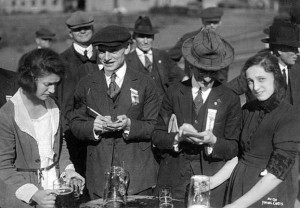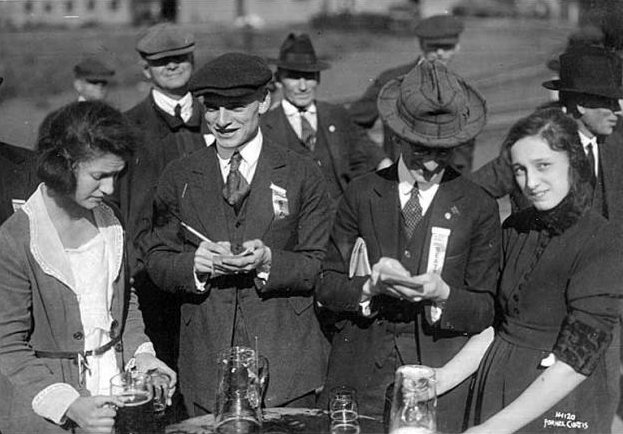
Yesterday afternoon, I found myself at the Scottish Poetry Library listening to the poems of George Bruce. An interesting man, Bruce: he lived long enough to be offered a contract by Herbert Chapman at Arsenal, to be a pioneer BBC radio producer and to launch arts television in Scotland. He was fluent in Doric and Scots as well as English, and before he died in 2002 left us a substantial poetic legacy. Some of this he read onto tape for the Scotsoun Makars Series: here and there in between the poems he’d leave a little grain of commentary.
One of these grains, lasting for a minute or so on tape, consisted of a passage he’d written in the 1930s about the state of society. For Bruce, as for Herbert Chapman, something had gone awry with the common people of Britain:
- There’d been a loss of kindness and compassion: Bruce illustrated this with the example of a popular newspaper printing pictures of dead bodies, the result of riot or war
- There was an increasing crudity of emotion and feeling, for which Bruce blamed the influence of the cinema
- People were living life at too fast a pace, and demanded sensationalism and excitement over the good old things.
Decline stories about Britain are a commonplace of course, but this one is interesting because it comes from and speaks of one of those periods in our history that is more often held up as an exemplar.
But it’s also a very modern decline story:
- The problem is with other people, not with the writer, and the writer offers no solutions and no ways forward
- The writer accepts tabloid views about the mores of ordinary people, but blames and disapproves of tabloids
- The writer sees the impact of new forms of media as harmful but is personally aware of and immune from that harm
- The writer assumes that the media presents a clear picture of society whilst also blaming the media for creating that society, but doesn’t acknowledge the contradiction in that
Bruce was born in 1909, and when he wrote his comment he was still a very young man. It’s worth pointing out that his opinions were at odds with those of his near contemporary, Robert Roberts, whose memoirs of Edwardian Salford The Classic Slum and A Ragged Schooling paint the interwar period as the first time everyone had shoes. At the other end of the spectrum, Stefan Zweig disagreed with him too: the Great War had at least begun the liberation of women in the West.
Late in life, he’d look back, and as is the way of these things, his opinions he claimed to have forged through experience turn out to be the opinions least likely to be changed by additional experience:
Edwin Muir made the mistake of saying, “Scots is becoming a language of sentiment.” Whereas, from my point of view, it was the reverse. It had been sentimentalized for a long time. Well, there was partly the fact of Burns, you see. Magnificent as he is, there was gradual deterioration-no, not gradual, rapid deterioration-just more and more of the sentimentality, and that was no good to me. Then there came, as significantly as anything, the condition of the times. As a student at Aberdeen University, the irrelevance of most of the poetry I was coming across struck me very fiercely-very considerably. I mean, 1925, 1926, right on up to the Hitler business. And therefore the sensation of a decaying civilization-I was almost going to say culture as well-this sensation was not being met in any way, as far as I knew, by any writers until I came to Ezra Pound. Then I knew that the nervous speech energy, which Pound largely got from Browning, had an immediate contact for me. And this was confirmed, surprisingly enough, by the Scots poet William Soutar, who in his poems wrote little of that side to it. But, in his secret diaries-(so to speak, they weren’t all that secret). Well, anyway, he kept a diary. He was in bed for nearly 13 years. There you find it repeated again and again, his being increasingly, aware of (what’s it called-yes) “the grossness of our society.” Well, you think what it’s like now, the awareness of the total vanishing of any kind of sensitivity whatsoever; only the corroboration remaining, I would say, of this grossness and this appalling fragmentation so that people don’t recognize they are all human beings. This is what we have witnessed since Willie died a long time ago. He died when he was forty. 1988 would have been his 100th. So, at any rate, there was that side of the matter, but still it was no use to me because I just felt that despite Pound’s natural energy, it seemed so hopeless and the deterioration seemed so imminent.
All this leaves little to say, save that it appears to be part and parcel of middle class literary life to point outwards at decline and decay that may be there or may not be, to blame the media for it in the media whilst making a living in the media, and condemning tabloid influence on opinion whilst agreeing with the tabloids about the nature of tabloid readers. It’s rough to pick on Bruce for all this – but read his late love poems to his wife and pick up on his attitude towards young people: the aforegoing is not an isolated incident.

The great advance in Women’s Rights in Britain predated 1970s feminism by half a century.
http://en.wikipedia.org/wiki/Sex_Disqualification_(Removal)_Act_1919
What’s really striking is that it seems to have worked with hardly any need to take court action about it. I’d say that’s a merit in a law of that sort.